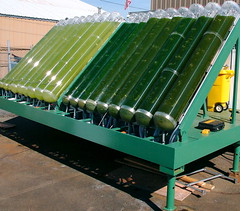Science Research needs continuity that cannot be found through the use of a market forces model.
How Algal Biofuels Lost a Decade in the Race to Replace Oil, an article by
Alexis Madrigal sums up the setback in alternative source energy research which happened in the 1980's.
We may now be ready to set things right, if we continue to fund scientific research for alternative energy sources, such as algae.
Carefully read the story of how we, yes we, abandoned alternative sources of energy and played our fiddles while the oil burned up our economy.
Ooops! Now we bemoan the fact. On the positive side, one thing is different now, and that is the ability of people, including scientists, to get their message across without the help of traditional media. Journalists and their bosses failed miserably to report on these issues, so greedy people who only look out for themselves were able to bring us, as a nation, to our knees with the high price of energy and the destruction of our economy.
How Algal Biofuels Lost a Decade in the Race to Replace Oil For nearly 20 years, a government laboratory built a living, respiring library of carefully collected organisms in search of something that could grow quickly while producing something precious: oil. But now that collection has largely been lost.
National Renewable Energy Laboratory scientists found and isolated around 3,000 species algae from construction ditches, seasonal desert ponds and briny mashes across the country in a major bioprospecting effort to find the best organisms to convert sunlight and carbon dioxide into fuel for cars. Despite meager funding, the Aquatic Species Program (.pdf), initiated under President Jimmy Carter, laid the scientific foundation for making diesel-like fuel from the fat that microscopic algae accumulate in their cells. Fifty-one varieties were carefully characterized as potential high-value strains, but fewer than half of those remain.
|








No comments:
Post a Comment